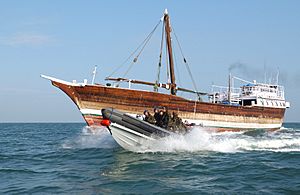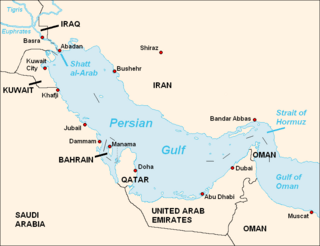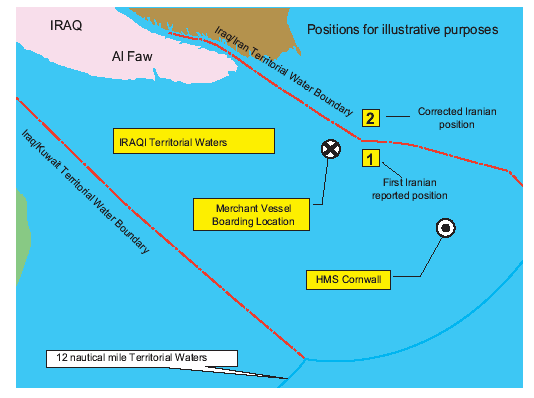2007 Iranian arrest of Royal Navy personnel facts for kids
Quick facts for kids 2007 Iranian arrest of Royal Navy personnel |
|||||||
|---|---|---|---|---|---|---|---|
 RHIB from HMS Cardiff, intercepting a cargo vessel off Iraq in 2002. Similar to those embarked on Cornwall. |
|||||||
|
|||||||
| Belligerents | |||||||
| Navy of the Islamic Revolutionary Guard Corps |
|||||||
| Casualties and losses | |||||||
| 15 captured | none | ||||||

On March 23, 2007, fifteen members of the Royal Navy from HMS Cornwall were checking a merchant ship. Suddenly, they were surrounded by the Iranian Revolutionary Guards Navy and captured near the Iran–Iraq coast. British forces said their team was in Iraqi waters, but the Iranians insisted they were in Iran's waters. The fifteen people were released thirteen days later, on April 4, 2007.
A year later, a British report said that the area where the event happened was not clearly agreed upon by Iran and Iraq.
Contents
What Happened: The Capture
On March 23, 2007, a team of eight sailors and seven Royal Marines were in two small boats from the warship HMS Cornwall. They were searching a merchant ship, called a dhow, for smuggled cars. Around 10:30 AM local time, crews from two Iranian boats stopped them. Six more Iranian boats then helped take them.
The British team was taken to an Iranian Revolutionary Guards base in Tehran for questioning. Iranian officials said the British sailors were in Iranian waters. Britain's Ministry of Defence (MoD) said the Iranians later gave "corrected" coordinates, which placed the boats in Iranian waters.
Britain first said the boats were clearly in Iraqi waters. However, a later report from the House of Commons' Foreign Affairs Select Committee found that the map the Ministry of Defence showed to the public was "inaccurate." This was because it showed a border line where no sea border between the two countries had been officially agreed.
The British government said the team was inspecting the merchant ship as allowed by a United Nations rule. The Cornwall was part of a group of international forces helping in the Iraq War.
Many diplomatic efforts were made to get the captured team released. On March 28, 2007, Iranian TV showed videos of some of the British sailors. This included a statement from captured Royal Navy sailor Faye Turney and a letter she wrote, apologizing for entering Iranian waters. Iran said that an apology from British officials would help release the team faster.
Who Was Captured
The fifteen Royal Navy and Royal Marines members who were captured were:
- Lieutenant Felix Carman RN (the highest-ranking officer)
- Captain Christopher Air RM
- Chief Petty Officer Declan McGee
- Acting Sergeant Dean Harris
- Leading Seaman Christopher Coe
- Acting Leading Seaman Faye Turney
- Lance Corporal Mark Banks
- Able Seaman Arthur Batchelor
- Able Seaman Andrew Henderson
- Able Seaman Simon Massey
- Able Seaman Nathan Thomas Summers
- Marine Paul Barton
- Marine Daniel Masterton
- Marine Adam Sperry
- Marine Joe Tindell
The Release
On April 4, Iranian President Mahmoud Ahmadinejad announced the release of the team as "a gift" to Britain. When they returned to the UK, the group said they had been under "constant psychological pressure" from the Iranian authorities. Some of their British equipment, like secure radios and navigation tools, was not returned.
The Ministry of Defence started a "detailed inquiry" into how the capture happened. This inquiry was led by Lieutenant General Sir Robert Fulton.
Where Did It Happen: The Border Dispute
The Algiers Agreement, signed by Iran and Iraq in 1975, set the border between them in the Shatt al-Arab waterway. This agreement defined the border up to a point called "R" in the Persian Gulf.
According to experts at the International Boundary Research Unit (IBRU) at Durham University in the UK, the location Britain gave for the capture was inside Iraqi waters, southwest of Point "R". Iran disagreed, saying their second set of coordinates showed the boats were in Iranian waters.
Richard Schofield, an expert on international borders, said that "Iran and Iraq have never agreed to a boundary of their territorial waters" beyond the Shatt al-Arab. This means the exact sea border was not clear. A British report later confirmed that the area was not covered by any internationally agreed border.
How the Operations Worked
HMS Cornwall was a warship that was part of a group called Combined Task Force 158 (CTF158). This group worked to keep the seas safe in the Northern Persian Gulf. It included forces from the Royal Navy, United States Navy, United States Coast Guard, Royal Australian Navy, and Iraqi Navy.
Captain Chris Air, a British officer, knew they were operating close to the unclear border between Iranian and Iraqi waters. He said it was important to "gather intelligence on the Iranians."
On March 23, 2007, the British team boarded a merchant vessel they thought was smuggling cars. After they finished their inspection and left the merchant ship, Iranian forces in six boats stopped them. The British team was then taken to an Iranian naval base.
Journalists on Cornwall reported that the British forces had chased and boarded a barge that had unloaded vehicles from the merchant ship. This ship and barges were suspected of smuggling.
The Cornwall could not get closer to the merchant vessel because the water was too shallow. A helicopter watching the operation flew off to do other checks. By the time Cornwall realized what was happening, the British team was already being taken to shore by the Iranian border patrol.
It was reported that the UK had been warned by the US Central Intelligence Agency about a higher risk of action from Iran. However, this warning did not lead to increased security levels in the area.
Rules of Engagement
British armed forces have "rules of engagement" that tell commanders what they can and cannot do. These rules were described as "de-escalatory," meaning they were designed to avoid making a situation worse.
It was reported that the British commander asked for advice from the Ministry of Defence but was told not to fire. British Prime Minister Tony Blair later said the British forces acted "entirely sensible." He believed that if they had fired, there would have been "severe loss of life."
Reactions to the Capture
British Reactions
The British government said the sailors were on a normal patrol, following a UN resolution. The Ministry of Defence said the sailors had boarded the ship inside Iraqi waters. They also said that a GPS system showed them to be well within the Iraqi area.
However, the Foreign Affairs Select Committee later said that the map provided by the government was "less clear than it ought to have been."
Communication with the boarding team was lost. The Cornwall's helicopter quickly returned to the scene. The pilot and the merchant ship's captain said that Iranian vessels surrounded the British team and took them away.
The British government demanded the team's return. Foreign Secretary Margaret Beckett said they expected the "immediate and safe return of our service personnel and boats." Prime Minister Tony Blair denied the British boats were in Iranian waters and called the capture "unjustified and wrong."
Some British newspapers called the captured team "hostages." The BBC later apologized for using words like "abducted" and "hostages."
Iranian Reactions
Iran's director for Western European affairs, Ibrahim Rahimpour, said the British boats had made an "illegal entry" into Iranian waters. He said they were "arrested by border guards for investigation and questioning." An Iranian Foreign Ministry spokesman called it "blatant aggression."
On March 24, the Iranian Fars News Agency said that navigation equipment found on the British boats showed the sailors knew they were in Iranian waters. An Iranian military official said the sailors had "confessed" to entering Iran's waters illegally.
Foreign Minister Manouchehr Mottaki said they were thinking about charging the British team with illegal entry. On March 29, the Iranian navy showed captured GPS devices, saying they showed the boats were inside Iranian waters. They also claimed the British had entered Iranian waters five times before.
On March 30, Iran's ambassador to Russia said that if charges against the British soldiers were proven, they would be punished. He suggested a diplomatic solution was still possible if Britain apologized.
On March 31, President Mahmoud Ahmadinejad called Britain "arrogant" for not apologizing. In a press conference on April 4, he praised the Iranian coastguard and announced that the sailors would be released as a "gift" to Britain.
Iraqi Statements
On March 24, an Iraqi military commander, Hakim Jassim, said that Iraqi fishermen had reported British gunboats in an area outside Iraqi control.
On March 25, the Iraqi foreign minister, Hoshiyar Zebari, asked Iran to release the team. He said that "according to the information available to the Iraqi authorities those soldiers were detained inside Iraqi waters." He added that they were working with international forces with Iraq's approval.
International Reactions
- European Union – German Chancellor Angela Merkel said the EU found it "fully unacceptable" that the British troops had been captured.
- United Nations – The Security Council expressed "grave concern" and asked Iran to allow Britain to see its personnel. They also asked for an early release of all fifteen crew members.
- United States – US President George W. Bush promised his support to Britain. He said, "The British hostages issue is a serious issue because the Iranians took these people out of Iraqi water." The Senate passed a resolution condemning Iran's actions. The Navy also sent two large aircraft carriers and 15 other warships to the Persian Gulf, though they said this was planned before the incident.
- Canada – The Canadian government called for the immediate release of the British team and supported Britain's view of where the capture happened.
- Australia – Australia also called for the immediate release of the British sailors.
After the Release
Iranian President Mahmoud Ahmadinejad announced the release of the captives on April 4, 2007. He repeated that Iranian waters had been entered and praised the border guards. He also criticized the British government for sending a woman with a child to a military operation. He asked Britain "not to prosecute them for their confessions."
The release was presented as an Easter "gift" to the British people. It is thought that Ahmadinejad acted after a letter from Pope Benedict XVI, who asked Iran's Supreme Leader to free the team as a "goodwill gesture before Easter."
The captives were not released to British officials but were put directly on a flight to the UK. They were given gifts like CDs, Persian candies, and books. After landing in London, they were flown to a Royal Navy base for medical checks, a full debriefing, and to meet their families.
Debriefing
At a news conference on April 6, 2007, some of the British team said that some Iranian sailors had become "deliberately aggressive and unstable," rammed their boats, and pointed machine guns at them. The British said they did not fight back because they believed they could not win and it would have caused "major strategic" problems.
When they arrived at an Iranian naval base, the British said they were "blindfolded, stripped of all our kit" and then moved to another room where they were "subjected to random interrogation." The next morning, they were flown to Tehran and taken to a prison. Here, the British sailors said "the atmosphere changed completely."
They said they were "blindfolded, their hands bound, and they were forced up against the wall." They faced "constant psychological pressure." They were given two choices: admit they were in Iranian waters and be returned to the UK, or face up to "seven years in prison." They claimed to have been "inside internationally-recognised Iraqi territorial waters."
They also stated that Faye Turney was kept separate from the men and was tricked into believing the men had been released for four days.
Past Incidents
There was a similar event on June 21, 2004, when eight British servicemen were held for three days. Iran said they had entered Iranian waters. They were released unharmed after Britain and Iran agreed it was a misunderstanding. Their equipment was not returned, and one of their boats was put in a museum in Tehran.
During their capture in 2004, one marine believed they went through a "mock execution" where they were blindfolded and heard weapons being cocked. They also appeared blindfolded on Iranian TV and were forced to apologize.
In the 2004 incident, the British boats were closer to the coast, and bad weather might have caused them to cross the border. In the 2007 incident, the boats were further out in open water, and visibility was good. The crew also had GPS equipment because of the 2004 event.
An Iranian news source claims that British forces have entered Iranian territory several times in recent years.
- On January 27, 2007, a British helicopter supposedly flew over Iranian airspace and left after a warning.
- On February 28, 2007, three Royal Navy boats allegedly entered Iranian waters.
A British inquiry later found that commanders on HMS Cornwall were not fully aware of these past events.
Images for kids




